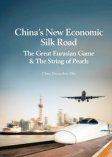Is Xi under Domestic Pressure as Belt and Road Initiative Criticism Intensifies?

With China currently embroiled in what is fast amounting to a trade war with the United States, many Chinese academics and economists are beginning to wonder if the Belt & Road Initiative introduced by President Xi Jinping is really such a good idea.
Unlike much of the Western world, Chinese academics are beginning to adopt a reverential attitude towards Donald Trump. What the West sees as short term, blow hard obstructionism, China, with its tendency to look rather more long term, sees a deliberate strategy of tearing down US-led global institutions in order to rebuild them again in greater favor towards the United States.
Hence, the recent bullying of Canada and Mexico over NAFTA, the same with the EU, and threats to pull out of the World Trade Organisation and potentially dismantle NATO. That, the Chinese view, is a deliberate policy to re-make the global order. What they feel is happening will move to a phase two – renegotiating the World Order favoring Washington even more, and thus being more able to curtail China’s interests.
Politically, too, the Chinese are increasingly regarding Trump as a master tactician. In his dealings with Xi Jinping, they note, he extracted concessions from Beijing no less than six times in both obtaining and then ensuring that sanctions against North Korea took effect. That caused immense friction between Beijing and Pyongyang, with the latter even threatening China with nuclear weapons – an unthinkable scenario in terms of the two countries mutual support since the Korean War.
They also point to the fact that Trump is the first President in 40 years to hit China in three consecutive areas – military, in the South China Sea, where US warships have been routinely patrolling reefs and shoals despite Beijing’s protests; trade; and ideology.
The ideology aspect comes from the way he tossed the existing US rule book aside to deal with Kim Jong-Un, eventually meeting him face to face in Singapore, and subsequently opening up a personal rapport. It is the same issue with Vladimir Putin, who many Chinese academics believe is a ploy to commence engagement with Russia in order to isolate China.
These beliefs are having an impact on Chinese domestic and foreign policy. It is a quiet rethink, but one that is also expressly critical of Xi Jinping. He has, so the reasoning goes, steered China into an untenable position in the South China Sea and has been unwise to aggravate the US in this arena. President Trump, the view holds, will not back down militarily, and his threats against North Korea could just as easily be directed at Beijing.
Trump is also not backing down over the China trade issue, and the view is that Xi Jinping has consequently over-reached himself. This includes the entire Belt and Road Initiative, which Chinese critics say has been in favor of disrupting other countries’ economies by exporting excess production. Instead, the view continues, China would be better off “pulling back” and reverting to a form of isolation and relying instead on developing the domestic market.
These are serious changes in fundamental policy thinking in China, and indicate that Xi Jinping may not be getting all his own way. For a man who recently amended the Chinese constitution to pave the way for him to continue as President, if he wishes, for life, these could be testing times. As Vladimir Putin recently stated, “It is a short walk from the Throne to the Gallows” and while no one is suggesting Xi Jinping is facing any threat to his leadership, a more passive future approach by China towards the Belt and Road Initiative, and its funding of overseas projects, may indicate not perhaps a China slowdown, but an easing on the throttle. If this happens, it is indicative of a policy shift, and one that will impact negatively upon China’s overseas direct investment.
About Us
Chris Devonshire-Ellis is the Chairman of Dezan Shira & Associates. The firm provides business advisory, strategic and professional services throughout China, ASEAN, India, Russia and the Belt & Road regions. For more information please contact silkroad@dezshira.com or visit us at www.dezshira.com
 Related Reading:
Related Reading:
![]() New World Order Trade Implications as Putin, Trump to Meet in Helsinki
New World Order Trade Implications as Putin, Trump to Meet in Helsinki
![]() After Trump, Putin and Xi – How the New World Trade Order Will Look in 2030
After Trump, Putin and Xi – How the New World Trade Order Will Look in 2030
China’s New Economic Silk Road
This unique and currently only available study into the proposed Silk Road Economic Belt examines the institutional, financial and infrastructure projects that are currently underway and in the planning stage across the entire region. Covering over 60 countries, this book explores the regional reforms, potential problems, opportunities and longer term impact that the Silk Road will have upon Asia, Africa, the Middle East, Europe and the United States.






